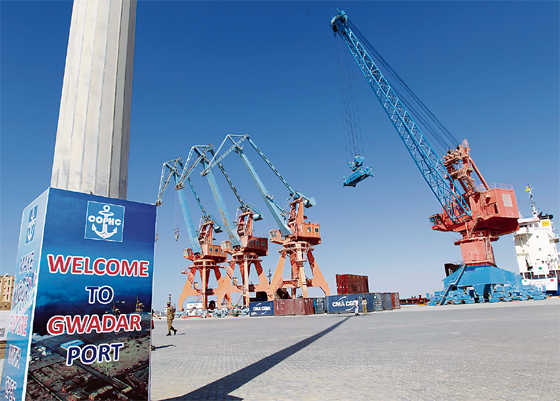The Chinese onslaught is relentless with its multi-named infrastructural initiative (One-Belt-One-Road) that is unparalleled in its scale, temerity of ambition and its ability to ensnare the participating countries within its ambit.

Lt Gen Bhopinder Singh (retd)The self-inflicted retreat of the US footprint from the global stage is matched with the commensurate increase in the Chinese presence, impact and strategic-hold. Armed with what Henry Kissinger calls an ‘subtle sense of the intangible’, the Chinese are making huge investments, from $60 billion committed for the African countries, $140 billion in loan commitments to Latin America, $60 billion for just Pakistan under the China Pakistan Economic Corridor (CPEC) initiative, to now even a potential toehold in the Pacific ocean country of Vanuatu! The Chinese onslaught is relentless with its multi-named infrastructural initiative (One-Belt-One-Road, Silk Road Economic Belt, The Belt & Road, 21st Century Maritime Silk Road and The Belt and Road Initiative) that is unparalleled in its scale, temerity of ambition and its ability to ensnare the participating countries within its ambit. Chinese President Xi Jingping first introduced the overarching concept in 2013, and since then a complex web of Chinese state-owned banks, private enterprises, sovereign funds and even the Chinese People’s Liberation Army (PLA) are intermingling to cast an irresistible promise of infrastructural, economic, social and security transformation, owing to these Chinese investments. Ironically, it is the regime of the Communist Party of China that is fueling the globalisation imperatives, with its intended goal of investing $1 trillion across 60 countries. Making the deal sweeter for the recipient country is the ‘conditionless’ collaterals, that unlike the investments from the Western powers and institutions like the World Bank or IMF, seeks no intervention in domestic policies, human rights, transparency requirements or any democratisation of the regimes concerned. The Chinese investment models entail no immediate changes and they allow for an ‘incremental correction’ that is more palatable to the populist regimes in recipient countries. The Chinese are said to be inking trade deals worth $600 billion with Iran (recently they were even offered the Chabahar port development, much to India’s consternation), sustaining Pakistani economy and seducing countries like the Maldives, Nepal etc. As Xi Jingping said, “It is time for us to take centre stage in the world” and that China was “standing tall and firm in the east”.However, there is growing disquiet of a sinister “debt-trap diplomacy” at work, wherever and whenever Beijing decides to invest its multi-billions, earned from the trade-surpluses accumulated for the last 25 years. The ‘Pearl Port’ of Hambantota in the southern tip of Sri Lanka is a classic case of a Chinese carrot ($1.3 billion investment) that morphed into a unserviceable debt trap within seven years, only to result into a sovereign surrender leading to a handover of the port to the Chinese on a 99-year lease! China formally opened its first overseas military base in Djibouti — the 90 acre real-estate earns the cash-tight Djiboutian dictator, Ismail Omar Guelleh, $20 million annually — besides having Chinese banks pump in $14.4 billion for infrastructure projects in Djibouti. This seamless transformation of the initial ‘economic investments’ leading to a ‘logistical base’ in the restive Horn of Africa, to finally a ‘military base’ in Djibouti has Australia, New Zealand and the US in a tizzy with eerie similarities of ‘Chinese Infrastructure funding’ in Vanuatu. The ‘generosity’ and ubiquity of Chinese investments in the island nation of 2,80,000 people already accounts for half of the $440 million foreign debt and that makes it vulnerable to the possibility of a military outpost like Djibouti, that typically follows the original agreement to allow Chinese naval ships to dock for ‘logistical purposes and refueling’.Similarly in Pakistan, the Chairman of the Senate Standing Committee on Planning and Development had forewarned on the CPEC, “Another East India Company is in the offing; national interests are not being protected. We are proud of the friendship between Pakistan and China, but the interests of the state should come first”. Facts like 91 per cent of the Gwadar port revenue accruing to the Chinese, with only 9 per cent residual left for the Gwadar Port Authority for the next 40 years, militate against the supposed ‘all-weather-friendship’ of the two countries. Embarrassingly, the Pakistanis had to turn down a Chinese demand to allow the exclusive use of Yuan as the standard currency in the Gwadar Free Trade Zone. As Pakistan commits 15,000 military troops of a dedicated ‘Special Security Division’ to physically secure CPEC assets, projects and personnel —murmurs are rife of local tensions with the ‘hordes’ of Chinese workers (apparently even Chinese prisoners), contracts going arbitrarily to Chinese companies as opposed to benefitting the local companies, besides a prospective annual payout of approximately $3.5 to $4.5 billion for Pakistan by 2024. A typical debt trap looms that could lead to a complete vassal-state that is encumbered,even more to Beijing’s diktats. Donald Trump alleges that China is attempting to “challenge American power” by seeking “to pull the region into its orbit through state-led investment and loans”. The Chinese model of investments and ‘bail-outs’ also leads to geopolitical subservience beyond commercial entrapment, eg Venezuela has a staggering Chinese debt of approximately $20 billion that makes it susceptible to dancing to China’s tunes. Already, Brazil, Chile and Peru have China as their top trading partner, as the dragon uses its financial-muscle initially, to fuel its geopolitical and military presence, later. Nearer home, the Chinese investment model has the Maldives enthralled with the millions rolling in, while the parallel matter of a Chinese listening post with radars and SIGNIT (Signals intelligence) that will also have ‘military application with provision for a submarine base’ is typical of the ‘Price’ for Chinese investments.
